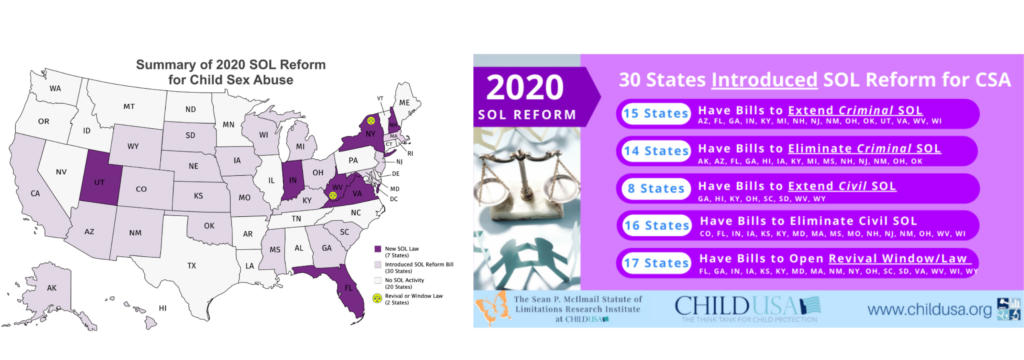
Last year was a banner year for helping child sex abuse survivors access justice by changing the statutes of limitations (SOLs). In 2019, with the public more awake than they’ve ever been to the injustice survivors faced by being shut out of courts, there was a surge of SOL reform, with 23 states and Washington D.C changing their SOLs for the better. The powerful SOL reform wave rode its way into 2020, with 30 states introducing legislation, but the outbreak of Covid-19 slowed its momentum. Despite being half-way through a tumultuous 2020, 7 states have already successfully passed new SOL laws.
Statutes of limitations are judicial housekeeping rules: they set the deadline for pressing criminal charges or filing a civil lawsuit for child sex abuse. Unfortunately, the vast majority of victims can not prosecute or file civil lawsuits because they miss the arbitrary procedural deadline. Most victims of child sex abuse miss the SOL because trauma affects them in a way that causes them to delay disclosure of their abuse until they are older, on average at age 52. These short SOLs have silenced victims from naming their perpetrators publicly, endangered children, favored perpetrators, and held reckless institutions unaccountable. When victims are empowered to disclose their abuse and sue for their injuries, the public benefits from finding out who the perpetrators are, how institutions covered up abuse, and it learns how to prevent child sex abuse.
There are two sets of victims the SOL reform movement aims to help: (1) the children being abused now who need the criminal and civil SOLs eliminated so they can access justice when they are ready, and (2) the child sex abuse survivors who are now adults and can’t get into court even though they want to, because their SOLs have already expired.
There is only one way to restore justice to adult survivors of child sex abuse whose claims are blocked by expired SOLs: to revive their civil claims. A permanently open revival window is the best help for these survivors as it allows them to bring older claims whenever they are ready. Vermont and Guam set impressive examples with their permanent revival windows, as these windows will never close to survivors. Kansas tried to pass a permanent window this year but failed, and Massachusetts has a bill pending now to open one.
West Virginia and New York are the only states so far to successfully pass revival laws in 2020. Now in West Virginia, any survivor who is under age 36 – even if their SOL was already expired – can file a civil claim for abuse. In light of New York court closings due to Covid-19, Governor Cuomo extended the Child Victims Act (CVA) window for 5 months to be open until January 14, 2021 with an executive order. This executive extension will likely be challenged in courts as beyond the Governor’s authority. Thankfully, the New York legislature also passed a 1-year extension to the CVA window, but survivors are anxiously waiting for Governor Cuomo to sign the bill and keep the window open until August 14, 2021. While 15 other states also introduced legislation this year to revive civil claims, most bills failed, though there is still hope for the bill in Massachusetts.
New Hampshire joined a growing number of states that have completely removed their civil SOLs for child sex abuse victims going forward. Now survivors in New Hampshire will have an unlimited amount of time to sue for their abuse. While 15 other states also tried to eliminate their civil SOLs this year, and 8 sought to extend them, those efforts stalled even in Colorado where the elimination bill had broad support because Senator Julie Gonzales killed her bill in the guise of passing a better bill with a window next year.
In terms of criminal SOLs, Florida, Indiana, Utah and Virginia all improved their SOLs for child sex abuse crimes, giving survivors more time to file charges. Florida now allows the crime of sexual battery of 16- and 17-year-olds to be prosecuted at any time, which is a huge improvement from the previous SOL which blocked prosecution after a victim turned 26 years old. Indiana, Utah and Virginia all modestly extended their criminal SOLs for child sex abuse crimes. There were 15 other states that introduced legislation to extend or eliminate criminal SOLs this year, but most have failed because of COVID-19.
The civil rights movement for children is gaining strength as the country bears witness to not only children’s lives being upended in the age of Covid-19, but also the safety nets disappearing for those who are sexually abused. That 7 states were able to pass new SOL laws in this climate is a huge success. We’re hoping to see more SOL reform laws passed in 2020, and we know the SOL movement will continue with great force in 2021.

